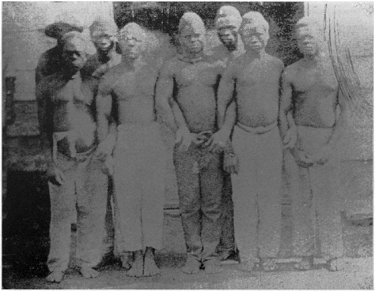History of Latin America
Week 3: Independence For Whom, By Whom?
|
Mon: |
The African Experience in Latin America |
Wed: |
MAP QUIZ!! and The Haitian Revolution |
|
The Varieties of Latin American Independence |
|
|
Readings: |
**Montejo, “A Cuban Slave's Testimony”; **Becoming Legally White in Venezuela" |

We'll talk in class about maroon communities and about the kinds of sources available for learning or guessing more about them, but Palmares is the only one with much on the Web.
Also check out this very nice site on African religion in Latin America;
Another on historical tensions between the Dominican Republic and Haiti
And finally, on Haitian and Haitian-American history, with provocative caricatures of Toussaint Louverture and the mid-19c Haitian leader Soulouque.
For those of you hoping to be engineers, in Mexico or elsewhere, listen here.
Finally, NPR did a series last fall on Latin American leftist leaders today--something we'll read about near the end of the semester, but this is a good resource now for mid-term and final project ideas. You can search around on NPR for other ideas if politics isn't your thing.
***********************************************************
A key aspect of Latin American slavery is that drawing on traditions of Iberian slavery, in many places Spanish and Portuguese America quickly gained a free black population equal or larger than its slave population:
| Country | Slaves | Free Blacks | Percent Free | |
|---|---|---|---|---|
| Spanish | ||||
Panama | 3,500 | 33,000 | 90% | |
| Cacao zone of Ven.: | 64,000 | 198,000 | 76% | |
| New Granada: | 80,000 | 420,000 | 84% | |
| Santo Domingo: | 15,000 | 80,000 | 84% | |
Portuguese
| ||||
| Minas Gerais, Brazil | 40.9% | 33.7% | ||
| Bahia, Brazil | 47% | 31.6% | ||
| Pernambuco, Brazil | 26.2% | 42% | ||
| Brazil overall | 34.5% | 31.4% | ||
| Non-Iberian | ||||
| Haiti (Saint Dominique)/ Martinique/Guadeloupe, combined: | 575,000 | 30,000 | 5% | |
| USA in 1790: | 660,000 | 32,000 | 4.6% | |
Think about what different ideas about "blackness" and "whiteness" might exist in a slave society that included large numbers of free black people engaged in a huge range of occupations--as opposed to one where being "black" generally meant being a slave.